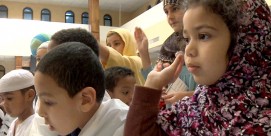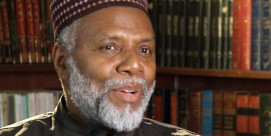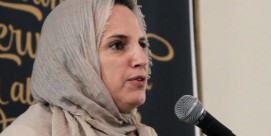John Green Commentary
Read the comments of John Green, professor of political science at the University of Akron, on the RELIGION & ETHICS NEWSWEEKLY/U.S. NEWS & WORLD REPORT survey:
OBSERVANT, TOLERANT, AND IGNORANT? The contrast in this poll between high levels of religious observance and high levels of religious tolerance is most interesting. Both observance and tolerance are probably a bit overstated (they usually are in polls), but the results are striking. The United States is both a religious and a tolerant country. For starters, this suggests that the threat to religious conservatism may be overstated and, by the same token, the fear of religious conservatives that religion is threatened by modern society may also be overblown.
The findings also provide a valuable context for understanding 9/11 and Islam. Americans drew comfort from religion after 9/11 in large part because they are religious, and they do not hold Islam responsible for 9/11 because of their religious tolerance.
Why is this? The poll provides three suggestions, and they are not entirely benign. First, the survey shows that most Americans are woefully ignorant of other religious groups and report very little contact with other religious people. So the observant/tolerant pattern may be the result of ignorance. Simply put, it is easier to tolerate people when you don’t know their peculiar beliefs and practices.
Second, the poll suggests that many Americans appear to be loosely tied to religious doctrines and beliefs — the very things that spark the most disagreement among religious people. Indeed, people may impute to others some version of their own faith. It could be the dominance of the “spiritual” element of religion that fosters both high levels of observance (perhaps of a highly personal nature) and tolerance of other people’s (highly personal) observance.
Third, the poll reveals that religion is only one of many influences that are relevant to how people lead their lives. Religiously observant Americans may be tolerant precisely because their faith is less relevant to many aspects of their lives.
So the United States is observant and tolerant, but this pattern may be based in part on ignorance, a lack of doctrinal commitment, and the limited relevance of faith to people’s lives.
SPIRITUAL EXPERIENCE TRUMPS RELIGIOUS BELIEFS?
The poll also offers a good story about religious beliefs versus experience. It is interesting, for example, that only one quarter of Christians say beliefs and doctrines are that most important part of religion, and almost one third name beliefs, doctrines, and creeds as their first reason for choosing a church. It could be that we have a group of “believers” and a group of “experiencers” — and perhaps a group that is a bit of both. Perhaps one set of factors goes into choosing a house of worship and a different set of factors goes into religion as a broader phenomenon.
Beliefs and doctrine pop out as particularly important for born again Christians, especially as the most important reason they choose a church to attend (two fifths of born agains select it as their first choice). On all mentions, they also do better, but the other religious groups catch up.
BIG DIVIDES IN AMERICAN RELIGION
The data suggest that race matters, and that there are several big divides in American religion. Born again Christians and black Protestants seem to be on one side of the divide and mainline Protestants on the other, with Catholics and others in the middle (and Catholics sometimes have distinctive positions).
There are striking differences between the responses of white born again Christians and other white Protestants/Christians. In religious terms, the born agains and the black Protestants often look alike, with mainline Protestants being much less religious — at least in these terms. White Catholics typically fall between these groups. A good example is the survey questions on the importance of religion.
Asked about the importance of religious faith in dealing with 9/11, black Protestants rate it highest (78% say it is “very important”), followed by born agains (73%); mainliners rate it low (37%) but still more than twice as high as seculars (15%). The same holds true for the question about whether 9/11 strengthened their faith in God.
The question about frequency of experiencing God’s presence or the presence of a spiritual force question also shows striking differences: 64% of white born agains and 71% of black Protestants report having had such a spiritual experience “many times.”
The questions about knowing people of other faiths also reveal some significant differences: 57% of the born agains and 68% of black Protestants don’t know a Jew. In contrast, only 31% of the mainline Protestants gave this response.
Information about other religions seems uniformly low across all faith groups. White Christians seem the least affected by contact with other faiths, but this is less true for black Protestants and other religions.
Interestingly, white mainline Protestants are the least likely of the religious groups to see Christians as very tolerant.
The born again Christians are less tolerant than other groups and most likely to believe their faith is the only true one. They are the most threatened by religious diversity, but here black Protestants are a close second. They are also the most likely to stress the importance of doctrines and beliefs. And when asked about a duty to convert others to Christianity, born agains (37%) and black Protestants (32%) put the most stress on conversion.
Asked about what influences their decision making, the numbers who chose the Bible and church teaching are very large for born again Christians and black Protestants, and lower for other groups.
To some extent, these kinds of patterns are to be expected. The difference is that there is overall a level of religious tolerance in all the groups.
WHAT THREATENS RELIGIOUS FAITH?
The number of Americans who see materialism as a threat (57%) is impressive, as is the number who are not threatened by a scientific worldview (67%). There is considerable worry about the mass media and “evil,” a concept that may be especially real to people because of 9/11. No one surveyed likes evil. Born again Christians demonstrate a special dislike of both popular culture (59%) and a nonreligious world view (53%), and they join with white Catholics in disliking materialism (both over 60%). These basic frequencies are revealing, but it might also be interesting to see if there is an underlying pattern. For instance, is concern over materialism connected with concern over the media? Is this because the media sells things, or just because it sells sexuality?







